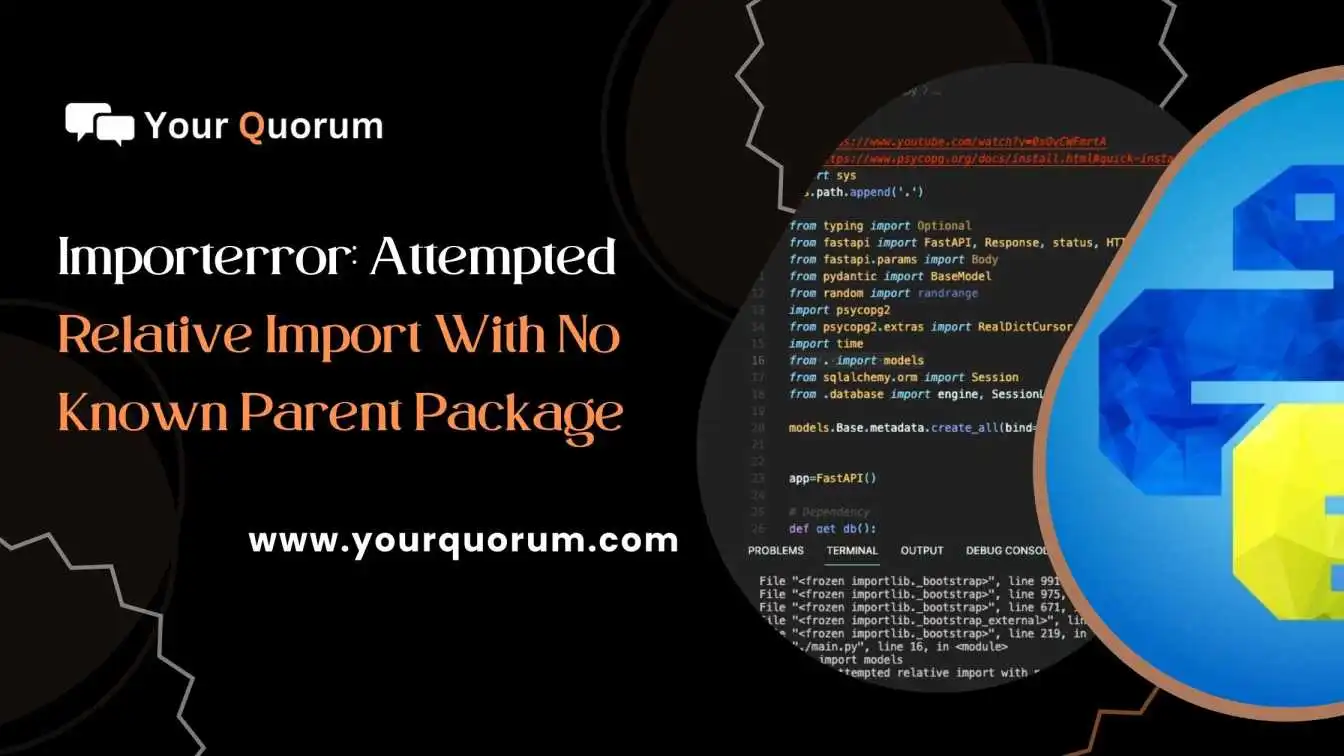
When you attempt to use a Importerror: Attempted Relative Import With No Known Parent Package, you get the error "attempted relative import with no known parent package." Relative import handling has changed in Python 3.x, which is why this problem often happens.
You may use one of the following methods to repair this error:
Convert the import statement to an absolute import by giving the whole package path. Do not use a relative import. For instance, you may use "from mypackage import mymodule" in lieu of the relative import line "from. import mymodule" if your module is named "mymodule" and it is housed in the package "mypackage."
You May Also Like:Testdome React JS Questions: Ultimate Guide & Tips for Success
Python is a scripting language that is interpreted. The main Python engine that executes your programs is the interpreter. You are only using the Python interpreter if you have ever ran Python straight from a terminal without the need for a file. As you input instructions, it will read them in and carry them out. However, this paradigm isn't really helpful since nobody wants to spend their whole day typing code at a terminal. The script is used in this situation. Most likely, you have already created a.py file, which is known as a script.
Python applications with several modules or packages often encounter the problem "ImportError: attempted relative import with no known parent package." Python divides code into digestible chunks using the notions of packages and modules. Python depends on the existence of a parent package to resolve the import statement when trying a relative import. Nonetheless, Python raises the "ImportError" if it is unable to locate the parent package.
ImportError: attempted relative import with no known parent package
Make an empty file called "init.py" in the same directory as your module to turn it into a package. Any initialization code you need for your package should be in this file, which is necessary to turn the directory into a package.
You should be able to import the module without getting the "attempted relative import with no known parent package" issue once you have done the required adjustments.
The "attempted relative import with no known parent package" problem may arise from changes made to the handling of relative imports in Python 3.x. When a module tries to import anything relative and there isn't a parent package to use as a reference, it throws this error. Here are a few instances of ways to resolve this issue:
Read Also:Complete DSA Roadmap: Your Ultimate Guide to Mastering Data Structures and Algorithms
If you're using a relative import and are receiving the error "attempted relative import with no known parent package," you may resolve the issue by switching to an absolute import in the import statement. As an example, consider this:
Assume you are attempting to import a module named "mymodule" from a package named "mypackage." It's possible that you have code like this:
Your module doesn't have a parent package, therefore if you're seeing the error "attempted relative import with no known parent package," you can remedy it by turning your module into a package. As an example, consider this:
Assume you are attempting to import a module named "mymodule." Nevertheless, neither the module nor its parent package are included in any packages. It's possible that you have code like this:
This section is meant to serve as a guide for you on how to organize your project as it develops.
Perhaps all you want to do is quickly create a Proof of Concept since you don't think this will become a big project. Hint: most significant endeavors start out little!
You are prepared to remove some functionality that is either not essential to your primary goal or is utilized in several contexts.
Read Also:Robotics Coding For Beginners: Unleashing Your Potential
When you attempt to use a relative import in a module without a parent package, you get the error "attempted relative import with no known parent package." This issue is often seen in Python 3.x and is associated with changes in the handling of relative imports.
In Python, relative imports allow you to import modules not by their absolute path in the file system, but by their relative location in the package hierarchy. This indicates that you are referring to the module's location in relation to the current file when you make an import statement.
Dot(.) notation is used in relative imports to indicate a location. The module is in the current directory when there is just one dot, in the parent directory of the current location when there are two dots, in the grandparent directory when there are three dots, and so on.